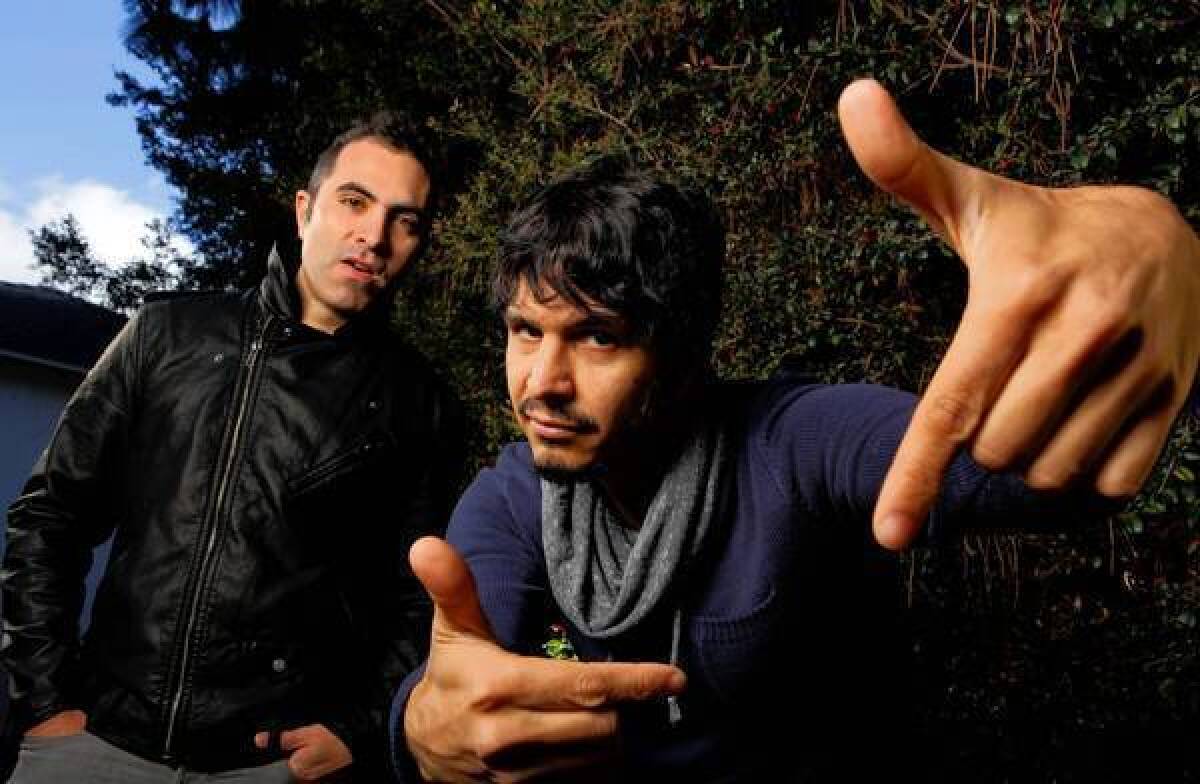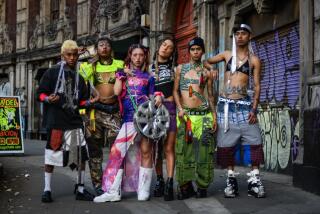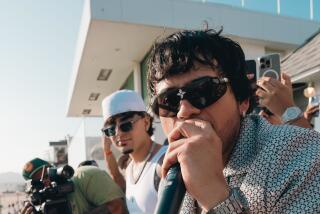Palenke Soultribe jump into the global dance groove

Like a secular shrine, the dining-room wall of Juan Diego Borda’s West L.A. bungalow is decorated with dozens of classic record-album covers.
“Abbey Road.” “Sticky Fingers.” “Dirty Dancing Machine.” “Lords of Acid vs. Detroit.”
For Borda and Andres “Popa” Erazo, the personable and articulate two-man electronica collective known as Palenke Soultribe, the wall is both inspirational and aspirational. It’s a visual nudge, as well as a testament, to their ambitions as DJ-producer-musicians focused on importing cumbia and other Afro-Caribbean rhythms into the hissing global stew that is electronic dance music.
PHOTOS: Iconic rock guitars and their owners
With its latest album, “Mar,” being released this month, and an upcoming tour of Europe and the United States that includes a date Thursday night at Los Globos in Silver Lake, Palenke Soultribe would appear to be several steps on its way down the long, winding road that leads toward the pop-music promised land.
Already, the pair have traveled many miles from their native Colombia, where their dreams of making a career in music were usually met with quizzical stares and stern parental admonishments.
“The families over there, they don’t believe in music, basically,” says Erazo, a Cali-born keyboardist who studied graphic design in college. “They think that music means you’re going to be forever a failure in your family or something like that. Basically the philosophy of our parents’ generation, they think that music is not something profitable.”
“And probably true in Colombia,” chimes in Borda, a Bogotá native who took his university degree in architecture and later studied audio engineering and production at UCLA. “Few people can say they can live out of music or anything related to music.”
Colombia’s loss became L.A.’s gain when Borda and Erazo, who’d been friends and first started collaborating in their homeland, relocated here several years ago and reunited. When not playing clubs and festivals, they now earn their primary keep as sound designers and mixers. Among their recent efforts is the design for the trailer for the beefcake action thriller “G.I. Joe: Retaliation.” They also worked on the Brad Pitt-starring zombie-apocalypse flick “World War Z.”
But their passion remains laying down grooves. With “Mar” (Spanish for “sea” or “ocean”) they’re attempting to dive into the swift-flowing currents of African kuduro rhythms, a dance form that originated in Angola and samples soca and zouk carnival music. More or less traditional, un-manipulated cumbia and vallenato beats also pulse through “Mar” on party-starter tracks like “Blanco & Negro.”
The generally lusher textures of “Mar” set it slightly apart from the group’s 2009 release “Oro” (Gold), which KCRW’s Ariana Morgenstern named as one of the Top 10 albums of that year. So do the teasing contributions on “Mar” of L.A.-based vocalist Naada.
“The albums are similar in a way,” Borda says. “It’s our sound; it’s difficult to escape from yourself.”
“Mar” also brims with abundant hints and reminders of what may be their most ambitious release to date, last year’s “Palenke vs. Palenke.” That disc was a
remixed reconsideration of Afro-Colombian classics first performed by master musicians from Palenke San Basilio, one of a few dozen remaining communities still inhabited by the descendants of 17th century runaway slaves.
The record took shape when the Colombia label Palenque Records opened its large archive of audio recordings to Palenke Soultribe (which takes its name from “palenque,” a generic term referring to escaped-slave settlements across the Afro-Latin diaspora).
“Mar,” issued on the group’s own label, is the second in a planned trilogy of albums whose titles — gold, oceanic blue, and the forthcoming “Rojo” (Red) — allude to the colors of the Colombian flag. “Each one of them will have a different visual concept, and different art of course, and different music,” he says. “‘Oro’ is meant to be like shiny, happy and pop. And it kind of opened the door for us, and one of the songs was used in a TV commercial. So for us it was oro, really, like gold, because it gave us some financial stability and motivation to keep on.”
Escaping the proverbial tortured artist’s garret was no small feat for Borda and Erazo. When they left Colombia, the nation had been reeling from an economic crisis exacerbated by the country’s decades-long civil war and attendant drug-related violence.
Though L.A.’s entertainment and advertising industries provide them with steady employment, Erazo and Borda say, it’s a tough place to be a musician. But, living here, they feel part of a broadening pan-Latin EDM conversation that stretches from Monterrey to Buenos Aires to Tijuana.
“Latin American electronica has a personality,” Borda says. “I feel like we, and all this generation of musicians, they always put the local sounds into it. It’s not trying to copy exactly what the British do or the Germans do. Because that would be a pastiche — very bad.”
--------------------------------
Palenke Soultribe
When: 9 p.m. Thursday
Where: Club Los Globos, 3040 W. Sunset Blvd., Los Angeles
Tickets: $10
Info: https://www.clublosglobos.com
PHOTOS AND MORE
COACHELLA 2013: Full coverage
THE ENVELOPE: Awards Insider
PHOTOS: Grammy top winners
More to Read
The biggest entertainment stories
Get our big stories about Hollywood, film, television, music, arts, culture and more right in your inbox as soon as they publish.
You may occasionally receive promotional content from the Los Angeles Times.










